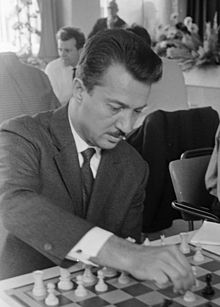Svetozar Gligorić
| Svetozar Gligorić | |
|---|---|

Svetozar Gligorić in 1966
|
|
| Full name | Svetozar Gligorić |
| Country | Yugoslavia |
| Born |
2 February 1923 Belgrade, Kingdom of Serbs, Croats and Slovenes |
| Died | 14 August 2012 (aged 89) Belgrade, Serbia |
| Title | Grandmaster |
| Peak rating | 2600 (July 1971) |
Svetozar Gligorić (Serbian: Светозар Глигорић, 2 February 1923 – 14 August 2012) was a Serbian and Yugoslav chess grandmaster. He won the championship of Yugoslavia a record twelve times, and is considered the best player ever from Serbia. In 1958 he was declared the best athlete of Yugoslavia.
In the 1950s and 1960s Gligorić was one of the top players in the world, and also among the world's most popular, owing to his globe-trotting tournament schedule and a particularly engaging personality, reflected in the title of his autobiography, I Play Against Pieces. (I.e., playing without hostility toward the opponent, or playing differently against different players for "psychological" reasons; playing the board and not the man.)
Gligorić was born in Belgrade to a poor family. According to his recollections, his first exposure to chess was as a small child watching patrons play in a neighborhood bar. He began to play at the age of eleven, when taught by a boarder taken in by his mother (his father had died by this time). Lacking a chess set, he made one for himself by carving pieces from corks from wine bottles—a story paralleling the formative years of his contemporary, the renowned Estonian grandmaster Paul Keres.
Gligorić was a good student during his youth, with both academic and athletic successes that famously led to him to be invited to represent his school at a birthday celebration for Prince Peter, who later became King Peter II of Yugoslavia. He later recounted to International Master David Levy (who chronicled his chess career in The Chess of Gligoric) his distress at attending this gala event wearing poor clothing stemming from his family's impoverished condition. His first tournament success came in 1938 when he won the Belgrade Chess Club championship; however, World War II interrupted his chess progress for a time. During the war, Gligorić was a member of a partisan unit. A chance encounter with a chess-playing partisan officer led to his removal from combat.
...
Wikipedia
